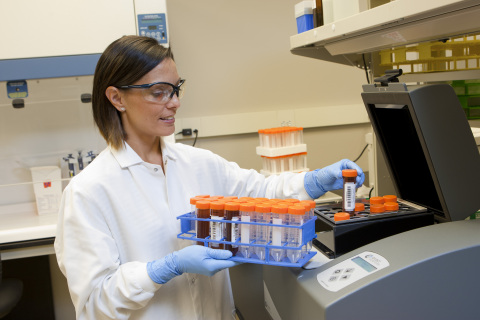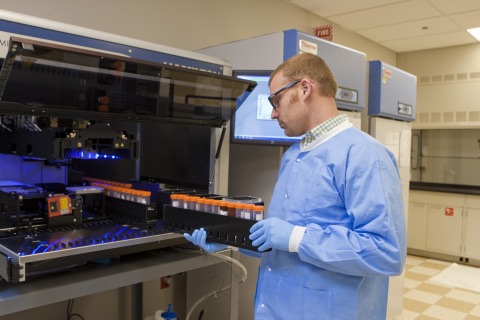MADISON, Wis.--(BUSINESS WIRE)--Exact Sciences Corp. (Nasdaq: EXAS) today announced that results from its DeeP-C pivotal clinical study have been published online in the New England Journal of Medicine. The peer-reviewed study, “Multi-target Stool DNA Testing for Colorectal-Cancer Screening” will also appear in the journal’s April 3, 2014 print issue.
The 10,000-patient DeeP-C study was designed to determine the performance characteristics of Exact Sciences’ multi-target stool DNA-based screening test, Cologuard ®, for colorectal cancer and to compare that performance to the fecal immunochemical test (FIT), a commonly used non-invasive colorectal cancer screening test. The DeeP-C study took place at 90 centers throughout the U.S. and Canada.
The DeeP-C data published in the NEJM elaborate on top-line data Exact Sciences announced in April of 2013. Data published today include:
- Sensitivity of Cologuard in detecting patients with colorectal cancer was 92% versus 74% for FIT;
- Sensitivity in detecting patients with colorectal cancers in Stages I-III —those determined by the American Joint Committee on Cancer to be associated with an increased rate of being cured—was 93% for Cologuard versus 73 % for FIT;
- Sensitivity for patients with advanced pre-cancerous lesions was 42% for Cologuard versus 24% for FIT;
- Cologuard detected 69% of patients with polyps with high-grade dysplasia versus 46% for FIT;
- Cologuard achieved a specificity of 87% versus FIT specificity of 95%.
Colorectal cancer is often considered the most preventable, yet least prevented cancer. One out of 3 adults age 50 and older has not been screened as recommended and, as a result, colorectal cancer remains the second-leading cancer killer in the United States. Colorectal cancer is highly treatable if found early, making the detection of pre-cancerous polyps paramount.
“We know that colorectal cancer can be prevented and can be highly treatable if found early through screening,” said lead author Thomas F. Imperiale M.D., of the Indiana University School of Medicine, Regenstrief Institute Inc., the IU Simon Cancer Center, and the Roudebush VA Medical Center in Indianapolis. “Sensitivity is the most important characteristic for screening tests because the primary role of such testing is to rule out diseases such as cancer. In our clinical study, the data show that Cologuard, the multi-target stool-based DNA test, is highly sensitive in detecting colorectal cancer and higher risk pre-cancerous polyps in a large, diverse average-risk patient population and has the potential to be an important screening tool.”
“We are very pleased with the data published today in the New England Journal of Medicine,” said Kevin T. Conroy, president and chief executive of Exact Sciences. “We believe Cologuard could be an important tool in the early detection of colorectal cancer. This is an important milestone for Exact Sciences and Cologuard.”
The Exact Sciences Cologuard screening test is an investigational device currently under review by the U.S. Food and Drug Administration (FDA) and is not available for sale in the United States. The FDA’s Molecular and Clinical Genetics Panel of the Medical Devices Advisory Committee is scheduled to review Exact Science’s PMA application for Cologuard on March 27, 2014.
New England Journal of Medicine Publication Webcast & Conference Call
Company management will host a webcast and conference call on Wednesday, March 19, 2014, at 11 a.m. ET to discuss the DeeP-C clinical trial data published today in the New England Journal of Medicine. The webcast will be available at www.exactsciences.com. Domestic callers should dial 877-212-6082 and international callers should dial 707-287-9332. An archive of the webcast and a replay of the conference call will be available at www.exactsciences.com or by calling 855-859-2056 domestically or 404-537-3406 internationally. The access code for the conference call and replay is 16207488. The conference call, webcast and replay are open to all interested parties.
About Cologuard, Exact Sciences’ Investigational Stool-based DNA Screening Test
Every day, millions of normal cells are shed from the colon lining into the stool stream. As these cells degenerate, they release DNA. All colon cancers start as precancerous lesions, commonly called polyps, and as those polyps develop, they also shed cells into the stool stream. Some of these cells contain altered DNA, reflecting acquired mutations and methylation found in pre-cancerous polyps and cancer. Cologuard is designed to have patients collect a stool sample at home and send it to a lab where the sample will be processed through a series of sophisticated laboratory procedures to isolate specific DNA targets. The targeted DNA is then amplified and analyzed for molecular alterations associated with cancerous and pre-cancerous conditions of the colon and rectum. Doctors will discuss results with their patients. If the Cologuard result is positive, patients should be referred for a diagnostic colonoscopy. While the science behind stool-based DNA screening is complex, the specimen collection process is easy, requiring no bowel preparation and no dietary restrictions.
About Exact Sciences Corp.
Exact Sciences Corp. is a molecular diagnostics company focused on the early detection and prevention of colorectal cancer. The company has exclusive intellectual property protecting its non-invasive, molecular screening technology for the detection of colorectal cancer. Stool-based DNA technology is included in the colorectal cancer screening guidelines of the American Cancer Society and the U.S. Multi-Society Task Force on Colorectal Cancer. For more information, please visit the company's website at www.exactsciences.com.
Cautionary Statement
Certain statements made in this news release contain forward-looking statements within the meaning of Section 27A of the Securities Act of 1933, as amended, and Section 21E of the Securities and Exchange Act of 1934, as amended, that are intended to be covered by the "safe harbor" created by those sections. Forward-looking statements, which are based on certain assumptions and describe our future plans, strategies and expectations, can generally be identified by the use of forward-looking terms such as "believe," "expect," "may," "will," "should," "could," "seek," "intend," "plan," "estimate," "anticipate" or other comparable terms. Forward-looking statements in this news release may address the following subjects among others: statements regarding the sufficiency of our capital resources, expected operating losses, anticipated results and timing of our pivotal clinical trial, expectations concerning our ability to secure FDA approval of our Cologuard test, expected license fee revenues, expected research and development expenses, expected general and administrative expenses and our expectations concerning our business strategy. Forward-looking statements involve inherent risks and uncertainties which could cause actual results to differ materially from those in the forward-looking statements, as a result of various factors including those risks and uncertainties described in the Risk Factors and in Management's Discussion and Analysis of Financial Condition and Results of Operations sections of our most recently filed Annual Report on Form 10-K and our subsequently filed Quarterly Reports on Form 10-Q. We urge you to consider those risks and uncertainties in evaluating our forward-looking statements. We caution readers not to place undue reliance upon any such forward-looking statements, which speak only as of the date made. Except as otherwise required by the federal securities laws, we disclaim any obligation or undertaking to publicly release any updates or revisions to any forward-looking statement contained herein (or elsewhere) to reflect any change in our expectations with regard thereto or any change in events, conditions or circumstances on which any such statement is based.





